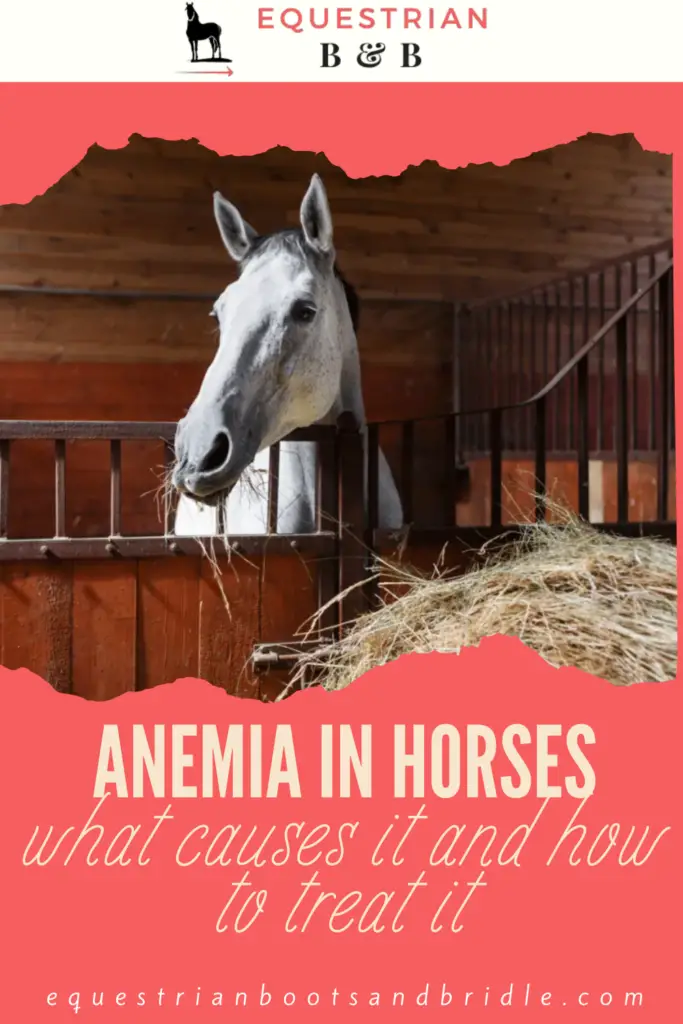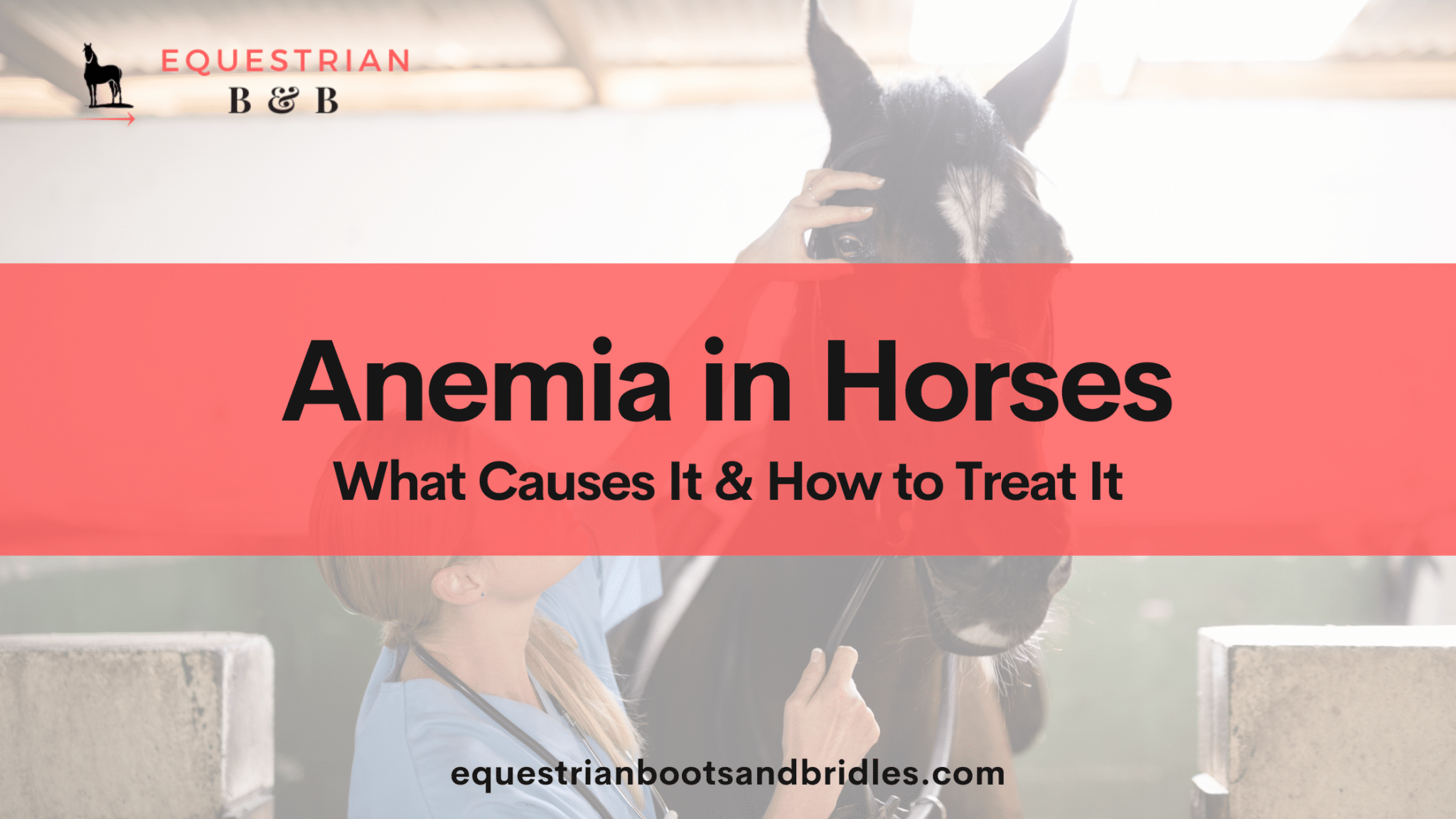Ever wondered why your horse looks just a little off-color and lethargic? Have you considered that anemia may be causing these symptoms? Chances are you don’t even realize anemia in horses is a symptom of a deeper issue that still has to be diagnosed.
If your horse has a cut or contusion, you instantly know that something is wrong. Perhaps they have a fever, which indicates an infection, giving you another clue to a diagnosis. But with anemia in horses, the signs are often quite simple and may be easily overlooked, with dire consequences.
What may seem like lethargy or laziness and poor performance, combined with being a little under-conditioned, can easily be chalked up to random signs when your horse may actually be very ill.
Here’s all the basic information on anemia in horses, including what it is, how to diagnose it, and how to treat it so you can care for your equine partner and give them their best life possible.
As always, the information in this article is for informational purposes only and should not be considered medical advice for your horse. You should always consult with your vet when treating your horse.
What Is Anemia in Horses?
When a horse is anemic, they have a deficiency in red blood cells, or they have inadequate iron stores in their blood and tissues. Usually, the loss of blood (the lack of red blood cells) is caused by an external injury, external parasites, or an internal parasite that drains the horse’s blood or dilutes their blood, so it transports oxygen at lower levels than required.
The result of anemia is that the horse is unable to effectively oxygenate their tissues, muscles, and organs. Oxygen deprivation sets in, and the horse becomes weakened. Affected horses lose muscle tone, struggle with a weakened immune system, and may require severe measures to recover.
There are two kinds of anemia that horses may develop: the first being regenerative anemia, which is blood loss the horse can recover from such as from an injury or parasitic activity. The second is nonregenerative anemia, where the underlying cause of blood loss is due to the horse’s own bone marrow being compromised and red blood cell production being insufficient.
A third kind of anemia is contagious and is spread by blood-feeding insects like mosquitoes and gnats. Equine infectious anemia is a contagious disease with some horses being carriers of the virus without showing any signs of illness. Only with a Coggins test can a horse be declared free of this disease, which sadly has no cure.
Whichever type of anemia your horse has developed, they will suffer a deficiency of red blood cells and also of iron stores. Iron deficiency causes several issues for horses.
How Does Iron Deficiency (aka Anemia) Affect Horses?
Iron deficiency in horses is also a side effect of anemia. Horses diagnosed with iron deficiency anemia may struggle to perform at their peak, while they may also develop digestive issues and severe blood imbalance and nutritional deficiencies. Iron is responsible for the red color of blood, and the red cells may become aplastic or odd-shaped, which can create severe circulatory complications.
When a horse has an iron deficiency, their blood doesn’t oxygenate as well, which means their vital organs and soft tissues don’t receive the required oxygen levels needed for healthy metabolic functioning.
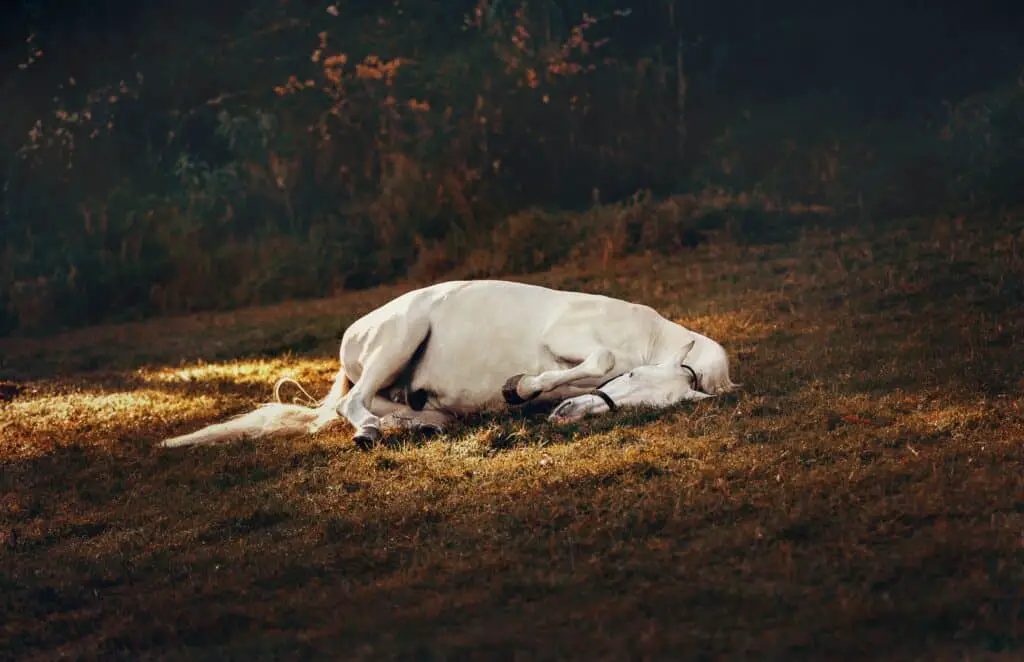
How to Spot Anemia in Horses
So how do you know your horse may have anemia or iron deficiency? The underlying causes of iron deficiency and a low red blood cell count often trigger the overall signs that a horse is anemic. Look for the following signs:
1. Loss of Appetite
Horses suffer oxygen deprivation when their iron count or red blood cell count drops, which may trigger a loss of appetite. The horse is simply too tired to forage continually, like they should. Another aspect is that the iron deficiency may cause ulcers, which will also lead to a drop in appetite. Weight loss often results.
2. External Bleeding
Iron deficiency may also be due to a chronic infection or external injury that continuously bleeds like severe mud fever. A horse with a serious external injury may suffer blood loss and become anemic.
3. External Parasites
A heavy parasite burden such as ticks and biting insects can also be a sign of iron deficiency and anemia. The horse becomes weakened and can’t fend off these parasitic organisms that feed off their blood. As a result, the horse will stand with head hung, legs often slightly spread to balance, and show faster breathing but have low blood pressure.
4. Internal Parasites
A horse that has signs of internal parasites, such as having worms in their stool, may also suffer anemia. Bloat, colic, and severe gas may be signs that a horse is anemic and is suffering from internal parasite damage.
5. Bloody Stool
Should the horse develop ulcers from stress or due to intestinal worm damage, their stool may become darker in color, indicating an internal bleed or sores. Their stool may also show a slimy residue as the gut lining becomes compromised and is shed.
6. Loss of Overall Condition
Because of blood loss, the horse’s overall condition will suffer. When the anemia is chronic, they may begin showing a dull coat, poor muscle tone, and loss of weight.
7. Lethargy
Fatigue and lethargy may put horses off their work, and you will notice a drop in performance and overall physical activity. With poor oxygenation of the muscles and organs, horses suffer muscle cramps because waste material isn’t being removed from their muscles after strenuous exercise, which makes them grouchy following work.
8. Yellow or Pale Mucous Membranes
If you suspect iron deficiency, you can easily examine the horse’s mucous membranes. Pale gums or inner eyelids indicate a loss of blood or anemia. If the gums are slightly yellow, it indicates liver involvement, where the red blood cells are broken down as part of the horse’s normal metabolic processes.
A horse with yellow mucous membranes is typically fighting off an infection or has developed liver disease.
9. Dark Colored Urine
Horses with anemia may also present with dark colored urine. Blood in the kidneys will empty through the urethra, which accounts for the bloody urine. This is a sign of iron deficiency and blood cell destruction.
10. Ulcers (or Signs of Ulcers)
If a horse is weak and lethargic, has pale gums, and is kicking under their stomach or stamping their feet restlessly, it’s a clear sign they are in pain. Add into this mix that the horse looks at their stomach frequently or kicks under their stomach, and you’ve got a sign of ulcers. Ulcers often bleed, causing intestinal blood cell loss and anemia.
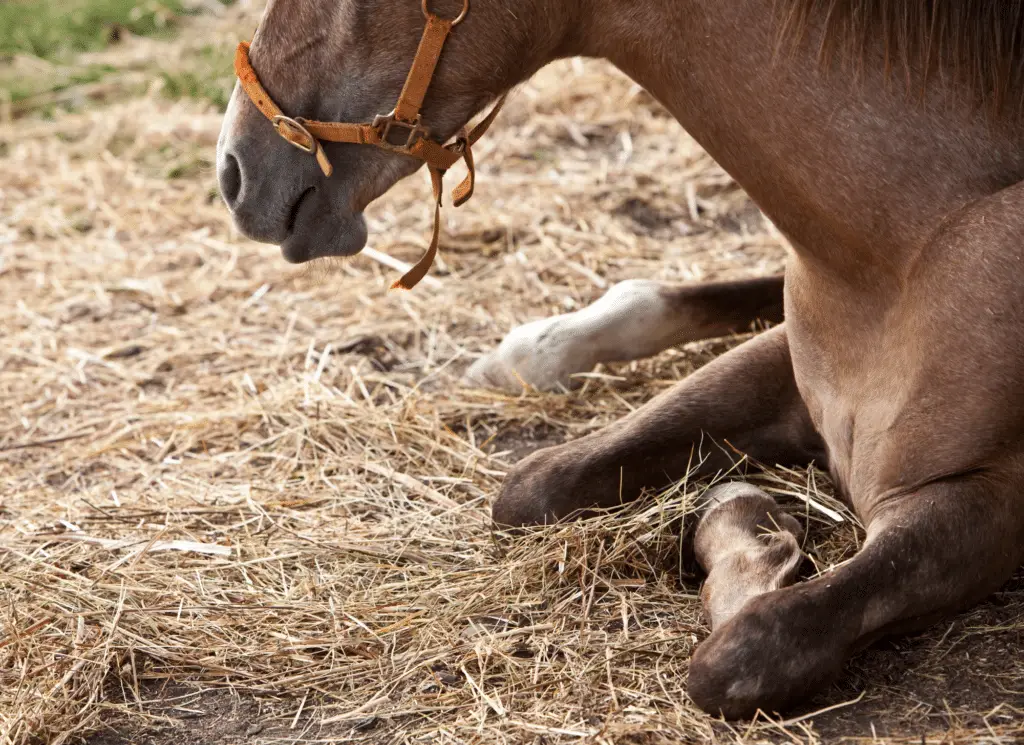
3 Main Causes of Equine Anemia and How to Treat Each
Knowing what is causing your horse to develop anemia is essential to being able to treat this condition. It is rare for anemia to result from a dietary deficiency, so hold off on the iron supplements until you’ve correctly diagnosed the cause of your horse’s anemia.
Here are a few causes of anemia in horses.
1. Blood Loss in Horses
One of the easiest ways to diagnose causes of anemia in horses is blood loss. Blood loss is also the most prevalent cause of anemia in horses.
External blood loss from wounds or injuries is clear to see, but internal bleeding can be harder to diagnose. Intestinal bleeding, ruptured blood vessels, pulmonary hemorrhage (from excessive exercise), and parasite action are usually the causes of internal blood loss.
Diseases such as chronic inflammatory disease and platelet disorders can also prompt blood loss, as can kidney failure where bleeding results.
Treatment Protocol: For blood loss, it may seem simple, but stopping blood loss is the first step in treatment and recovery. To stop blood loss from internal causes may require more diagnostic tests than merely searching for a trauma site such as with external blood loss.
Starting with a visual inspection of the horse is a good idea as you may find injuries you were not aware of, parasites that had gone unnoticed (and therefore untreated), or exercise-related trauma and blood loss.
Once the cause of blood loss has been determined, the horse can receive the treatment required for recovery. Some forms of blood loss anemia are termed regenerative anemia, and the horse can recover fully from these. When it’s disease related, recovery may not be possible.
2. Hemolytic Anemia in Horses
When the horse loses blood because of destruction of the red blood cells, it’s known as hemolytic anemia. It often happens when the horse is exposed to a toxin or virus that destroys their red blood cells faster than these can be produced in their bodies.
If the horse’s liver is compromised, or their bone marrow is negatively affected (aplastic anemia), they won’t be able to produce sufficient red blood cells to meet their metabolic needs. Anemia occurs as the blood is unable to carry sufficient oxygen to their organs and tissues.
Other causes of hemolytic anemia are recurrent infections and inflammation, where the body fights itself, and autoimmune diseases such as equine infectious anemia. With equine infectious anemia, the horse’s immune system becomes compromised, red blood cell counts drop, and the horse remains infected because of the incurable nature of this disease.
Treatment Protocol: Blood tests, Coggins test, and even CT scans (if bone marrow involvement is suspected) may be required to fully diagnose what is causing the destruction of red blood cells in your horse. Until the exact cause is determined, it will be difficult to treat.
When infection is the cause, appropriate prescribed antibiotics should be used, with anti-inflammatories administered to combat inflammation. The horse’s blood test will reveal what type of antibiotic is required. A complete blood count can also help determine dosages and supportive therapy.
Giving your horse additional iron may have adverse effects, so knowing how deficient your horse is in iron will help you determine what quantities to supplement minerals. Your vet will draw blood and perform a count of hemoglobin concentration, which also helps determine what your horse’s blood oxygenation levels are.
3. Insufficient Red Blood Cell Production in Horses
A horse that has insufficient red blood cells may have anemia because the horse doesn’t produce red blood cells in quantities that meet their health needs. There are several reasons why a horse won’t produce red blood cells in sufficient quantities.
One of these is that there isn’t enough iron available to produce red blood cells. Inflammation and chronic infections funnel iron stores toward the immune system and defensive cells, reducing the quantities of iron that are available to make red blood cells. Bone marrow disease, kidney failure, and certain cancers can all contribute to iron deficiency and result in anemia.
Older horses may also suffer a drop in red blood cell production, which can cause anemia.
Treatment Protocol: A horse’s circulatory system will only produce poor quality red blood cells when there is a deficiency of the necessary nutrients for red blood cell production. So supplementing with the required nutrients such as biotin, iron, and vitamin Bs can help improve red blood cell formation.
Care should be taken to establish whether the horse actually needs these additional supplements to make the required red blood cells as too much of a particular supplemental mineral or vitamin may cause further damage to the kidneys and liver. In severe cases of red blood cell deficiency, the horse may require a blood transfusion until an underlying disease or bacterial infections can be treated.
If your veterinarian suspects anemia caused by vitamin deficiencies, a balanced feed with plenty of folic acid, vitamin E, and B vitamins can help your horse recover faster.
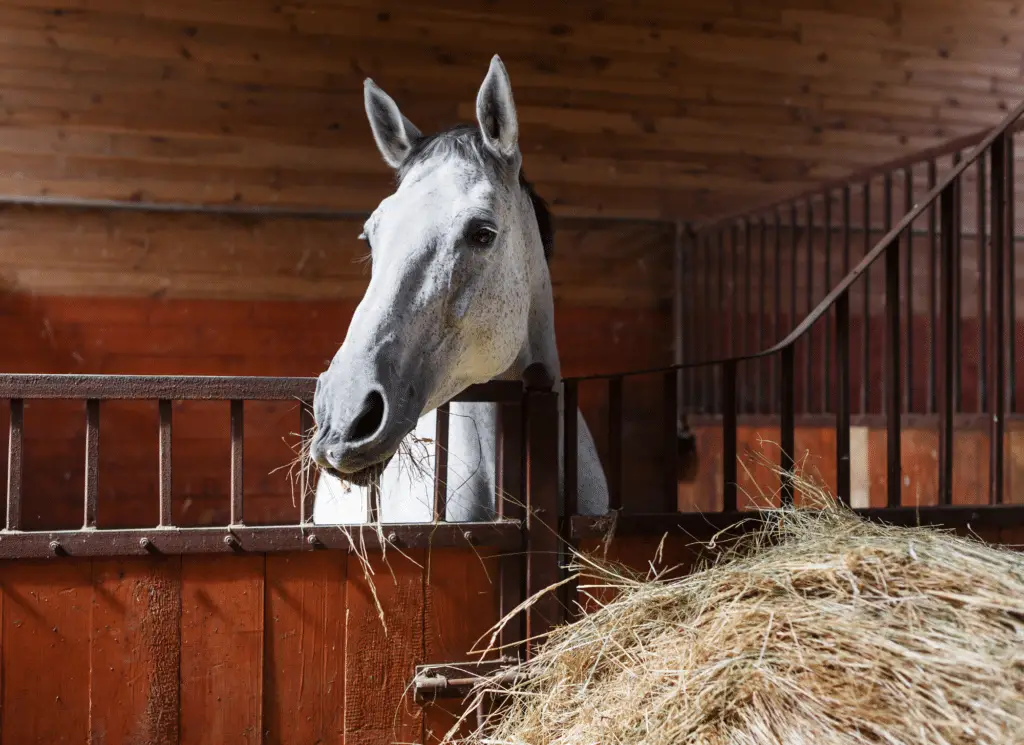
More FAQs About Equine Infectious Anemia
What foods can horses with equine infectious anemia eat?
Horses with anemia often suffer from iron deficiency, which can be treated supportively by feeding iron-rich foods such as fenugreek, nettle, and kelp, which boost the horse’s natural iron intake and help fight off fatigue while also boosting the horse’s immune system.
Can anemia in horses be caused by worms?
Worm damage can result in stomach ulcers, and horses may begin bleeding internally due to excessive worm activity. The loss of blood can cause anemia, as can iron deficiency caused by an immune reaction to the worm activity.
Final Word on Anemia in Horses
While anemia rarely occurs due to a vitamin deficiency, starting with the horse’s diet is always a safe bet. However, don’t grab the first dietary supplements that you believe may boost your horse’s iron levels.
Instead, let your vet do full blood work and determine exactly what is at the root of your horse’s anemia. Treating underlying causes is vital for your horse to make a recovery or to manage long-term anemia.
For more information on how the horse’s health is affected by their gut health to prevent impaction, read my guide to horse impaction.
Pin the image below to your boards on Pinterest.
You can also follow along with me on Pinterest!
